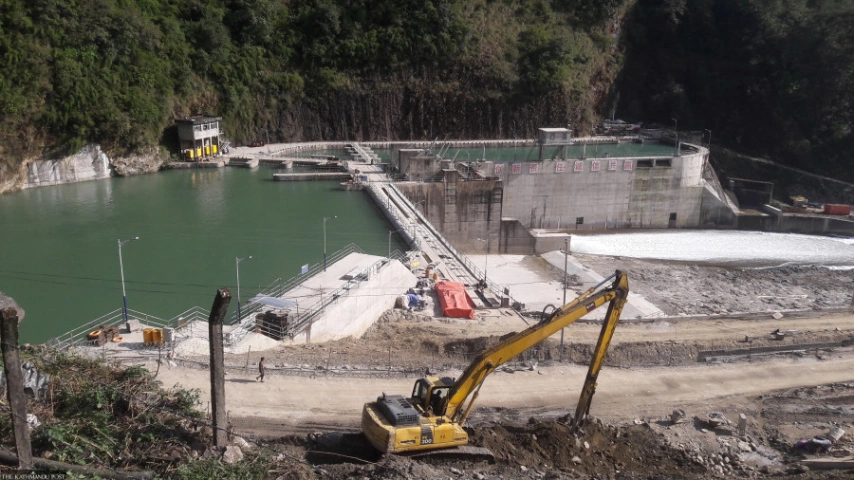

The Sunkoshi-3 hydro project may become the first trilateral renewable energy project involving Nepal, Bangladesh and India
Kathmandu: Nepal and India want to involve India in developing a hydropower project in Nepal that they previously had planned to undertake on their own.
At least three Nepali government officials confirmed to India Narrative that the two countries reached an understanding to involve India for the development of the 683 MW Sunkoshi 3 hydropower project, making the enterprise a trilateral venture.
Nepal and Bangladesh have long been talking about developing this project, located at the border of Ramachhap and Kavrepalanchok districts of central Nepal. Two countries reached such an understanding during the fifth meeting of the secretary-level Joint Steering Committee on energy cooperation between Nepal and Bangladesh on May 15-16 held in Bangladesh’s Patuakhali.
“Two countries agreed to request India to be a joint venture partner to develop the project during the meeting,” Prabal Adhikari, power trade director at Nepal Electricity Authority (NEA), the state-owned power utility body, told the India Narrative.
During the meeting, the two countries had decided that the NEA and Bangladesh Power Development Board (BPDB) would sign a joint venture agreement within the next six months to develop the project.
“Before a joint venture agreement is signed, two sides agreed to make efforts to bring India on board to develop the project under trilateral cooperation,” said Adhikari, who was also a part of Nepali delegation. “A trilateral joint venture agreement can be signed if India agrees to join in.”
The proposed project’s feasibility study and environment impact assessment (EIA) have already been completed, according to the Department of Electricity Development, which issues survey and construction licences for power projects.
Currently, the project is in the basket of Nepal Government and following the formation of a joint venture company, it will have to acquire a survey licence from the government, an official of the department said.
Even if New Delhi delays its decision on joining as joint venture partner, Nepal and Bangladesh agreed to keep the door open for the neighbouring giant to join in later. “In such a situation, Nepal and Bangladesh will first sign a joint venture agreement where a statement will also be included opening the door for India to join later as equity investor,” said Dirghayu Kumar Shrestha, chief of transmission directorate at the NEA, who was also part of Nepali delegation.
Nepali officials said that Kathmandu first proposed Dhaka for India’s involvement in Sunkoshi-3 project, particularly why involvement of Indian companies in developing this project would help facilitate transmission of its power to Bangladesh from Nepal via Indian territory.
“Bangladesh is likely to be less enthusiastic to invest in the project as long as it is not guaranteed that India allows it to bring power generated from this project,” said Adhikari.
The Nepal government had conducted an extensive discussion on the matter among its various agencies related to energy before making the proposal to the Bangladeshi side, officials said.
Involvement of India in Sunkoshi-3 project was discussed also in the context that New Delhi has also been showing eagerness to promote connectivity within the Bangladesh, Bhutan, India, and Nepal (BBIN) network, they said.
As per the Joint Vision Statement on Power Sector Cooperation between Nepal and India issued in April last year, the two countries agreed to expand cooperation in the power sector and include partner countries under the BBIN framework. But three countries are yet to sit together to discuss trilateral cooperation in the power sector.
“The Bangladeshi side however notified us that it had reached an agreement in principle with India to formulate a trilateral mechanism including with Nepal to enhance cooperation in the power sector,” said Adhikari.
Talks about trilateral cooperation in the energy sector are taking place at a time when all three countries are making push for renewables. For example, Nepal aims to ensure 15 percent of the total energy demand is supplied from renewable energy sources—hydropower and other alternative energy by 2030. Likewise, the Indian government has set an ambitious target of having 500 GW of installed renewable energy by 2030 to bring in a green revolution in the country. Bangladesh also wants to generate 40 percent of its electricity from renewables by 2041.
And, there is the possibility that three sides could soon present an example of trilateral cooperation in the power sector. During Nepali Prime Minister Pushpa Kamal Dahal’s visit to India from May 31 to June 3, New Delhi had agreed to facilitate the export of 40MW of Nepal’s power to Bangladesh.
“The Prime Minister of Nepal welcomed the decision of India to facilitate the first trilateral power transaction from Nepal to Bangladesh, through Indian grid with an export of 40 MW of power,” Nepali embassy in New Delhi said in a press statement after bilateral meeting was held between Nepali Prime Minister Dahal and his counterpart Indian Prime Minister Narendra Modi on June 1.
“Both sides committed towards greater cooperation at sub-regional level including in the energy sector.”
India decisively asserted its military superiority over Pakistan during this month's brief but intense conflict,…
Trade associations and local business groups in Pakistan-occupied Gilgit-Baltistan (PoGB) launched an indefinite protest on…
A human chain and protest march was organized by various organizations in front of the…
The United States on Saturday announced the expansion of its security partnerships with India through…
Highlighting the use of indigenous platforms during Operation Sindoor, Chief of Defence Staff (CDS) General…
Congress MP Shashi Tharoor on Friday (local time) said that Colombia will issue a statement…